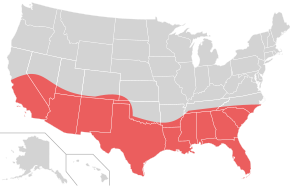Sun Belt
 |
|
| Regional statistics | |
|---|---|
| Composition |
|
| Demonym | Sun Belter |
|
Population - Total - Density |
144,460,016 (2016 est.) |
| Largest city | Los Angeles (pop. 3,971,883, est. 2015) |
| Largest Metropolitan Area | Greater Los Angeles (pop. 18,679,763, est. 2016) |
The Sun Belt is a region of the United States generally considered to stretch across the Southeast and Southwest. Another rough definition of the region is the area south of the 36th parallel.
The main defining feature of the Sun Belt is its warm climate, with extended summers and brief, relatively mild winters. Within the region, desert/semi-desert (California, Nevada, Arizona, New Mexico, Oklahoma, and Texas), Mediterranean (California), humid subtropical (Oklahoma, Texas, Louisiana, Mississippi, Alabama, Florida, Georgia, South Carolina, and North Carolina), and tropical (Florida) climates can be found.
The Sun Belt has seen substantial population growth since the 1960s from an influx of people seeking a warm and sunny climate, a surge in retiring baby boomers, and growing economic opportunities. The advent of air conditioning made it easier for people to deal with the summertime heat in the Desert Southwest, where triple-digit temperatures in Fahrenheit (higher than 37.7 Celsius) are common. In recent years, water shortages, droughts, and drug trafficking near the Mexican border have become problems in the Southwest.
...
Wikipedia
